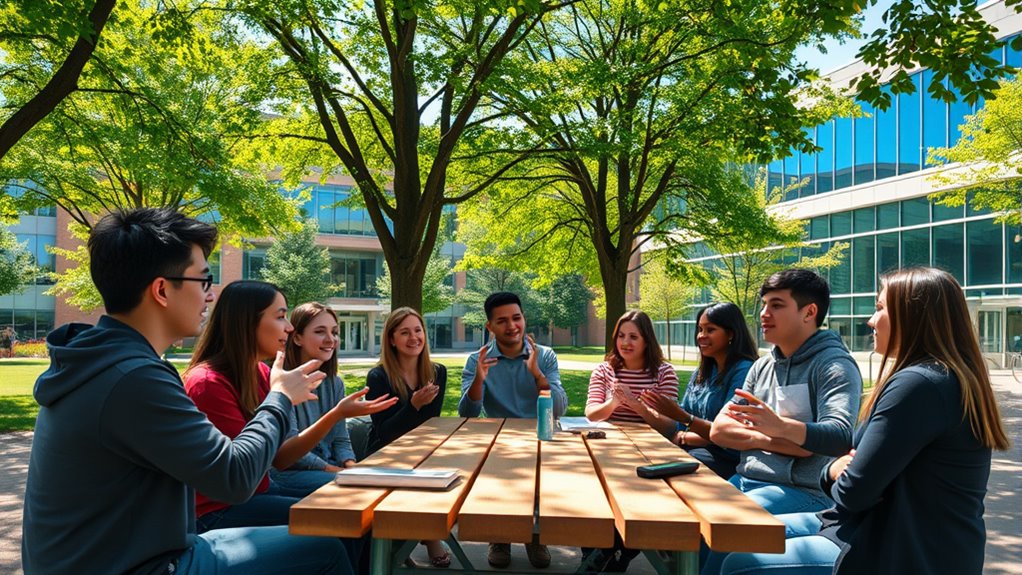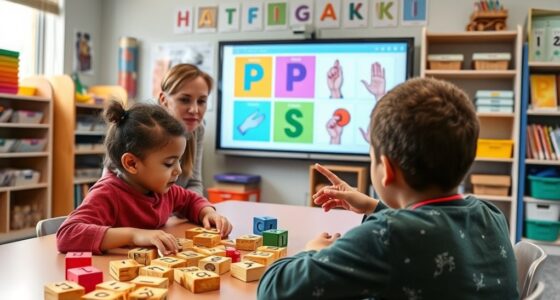Many study abroad programs and universities now support deaf students with dedicated sign language services, accessible campus facilities, and inclusive housing options. They offer interpreters, visual alert systems, and technologies like captioning apps to help you communicate effectively. Some programs also partner with local Deaf communities worldwide, providing cultural exchange and peer support. With scholarships and tailored resources, you can fully participate and thrive abroad. Keep exploring, and you’ll discover ways to make your experience truly accessible.
Key Takeaways
- Look for programs with dedicated sign language interpretation and accessible communication services integrated into the curriculum.
- Choose universities that offer inclusive facilities, visual alert systems, and accessible housing for deaf students.
- Opt for programs partnering with local Deaf communities to provide cultural exchange and peer mentorship opportunities.
- Prioritize study abroad options that utilize assistive technologies like captioning apps and visual communication tools.
- Seek scholarships and funding specifically supporting deaf students pursuing international education experiences.
Programs With Dedicated Sign Language Support Services
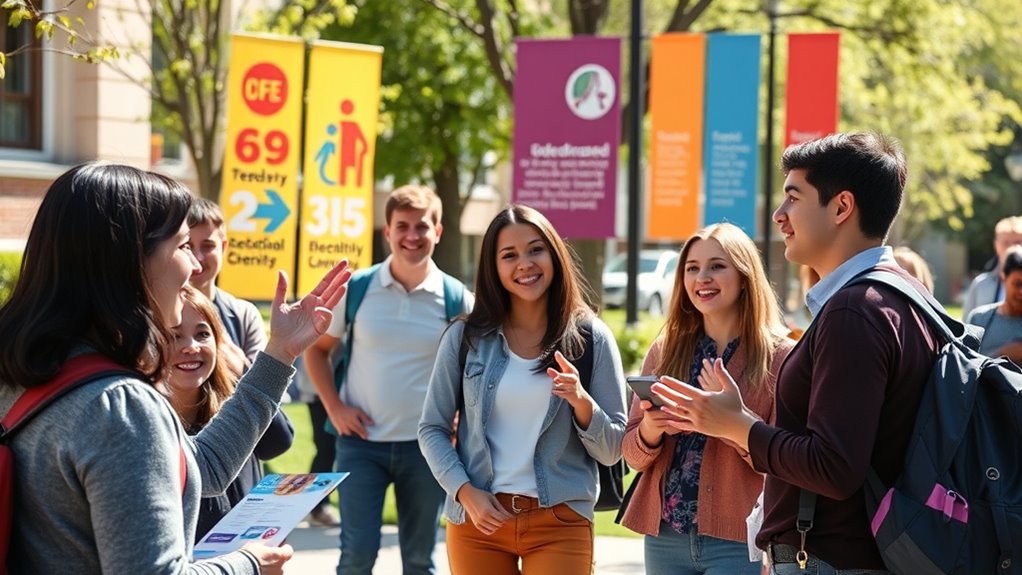
Programs with dedicated sign language support services offer deaf students a more accessible and inclusive study abroad experience. You’ll benefit from on-demand sign language interpretation, ensuring you can fully participate in classes, social activities, and campus events. These programs understand that clear communication is essential and prioritize matching your needs with qualified interpreters. Additionally, accessible housing options are often provided, featuring visual alerts, vibration alarms, and other accommodations that support your safety and comfort. This all-encompassing support helps you focus on your studies and cultural experiences without worrying about communication barriers or inaccessible living arrangements. By integrating on-device AI features, programs can further enhance communication and accessibility, ensuring you are supported throughout your journey. With these dedicated services, you’re empowered to engage confidently and fully immerse yourself in your new environment.
Universities Offering Inclusive Study Abroad Opportunities

Many universities now provide inclusive study abroad programs that prioritize accessibility and support for deaf students. You’ll find campuses with accessible facilities and dedicated sign language services to help you succeed abroad. These resources make it easier to participate fully and feel connected wherever you go. Additionally, understanding color accuracy can enhance your overall experience, especially in settings where visual communication is essential.
Accessible Campus Facilities
Accessible campus facilities are essential for ensuring that deaf students can fully participate in study abroad programs. When campuses prioritize campus accessibility, they create an environment where deaf students can navigate daily activities without barriers. Features like visual alert systems for emergencies, accessible signage, and quiet study areas support inclusivity. While sign language interpretation is often discussed separately, it’s important that campuses also ensure infrastructure readiness—such as clear wayfinding and visual communication tools—that complement these services. These facilities help eliminate obstacles, making it easier for deaf students to engage academically and socially. A thoughtfully designed campus fosters independence, confidence, and integration, allowing you to focus on your educational experience abroad without unnecessary concerns about accessibility. Additionally, incorporating accessible communication methods can further enhance the inclusivity of campus environments for deaf students.
Sign Language Support Services
Universities committed to inclusivity recognize that all-encompassing support extends beyond physical accessibility. To truly accommodate deaf students abroad, they provide sign language interpreters who facilitate seamless communication in academic settings, social activities, and emergency situations. These interpreters ensure you can participate fully and independently. Additionally, universities often offer accessible housing equipped with visual alerts, vibrating alarms, and other accommodations tailored to deaf students’ needs. By combining sign language support services with accessible housing, these programs create an environment where you can focus on your studies and cultural experiences without barriers. This extensive approach fosters a welcoming atmosphere, empowering you to engage confidently in your study abroad journey while feeling supported every step of the way. Incorporating Self Watering Plant Pots into accessible living spaces can also enhance independence and ease daily routines for students with diverse needs.
International Programs Focused on Accessibility for Deaf Students

International programs designed to support deaf students are increasingly emphasizing accessibility to guarantee meaningful participation. You’ll find many programs incorporate sign language interpreters and real-time captioning to bridge communication gaps. These accessibility services ensure you can fully engage in lectures, discussions, and cultural activities without barriers. Some programs also offer specialized orientation sessions on how to use these resources effectively. By prioritizing accessibility, these programs create inclusive environments where deaf students can thrive academically and socially. You won’t need to worry about feeling disconnected or overlooked—these initiatives aim to make your study abroad experience as seamless as possible. Additionally, assistive technologies are often integrated to enhance communication and learning experiences. As a result, you can focus on learning, exploring new cultures, and building connections, knowing that your accessibility needs are fully supported.
Partnerships With Deaf Communities Around the World
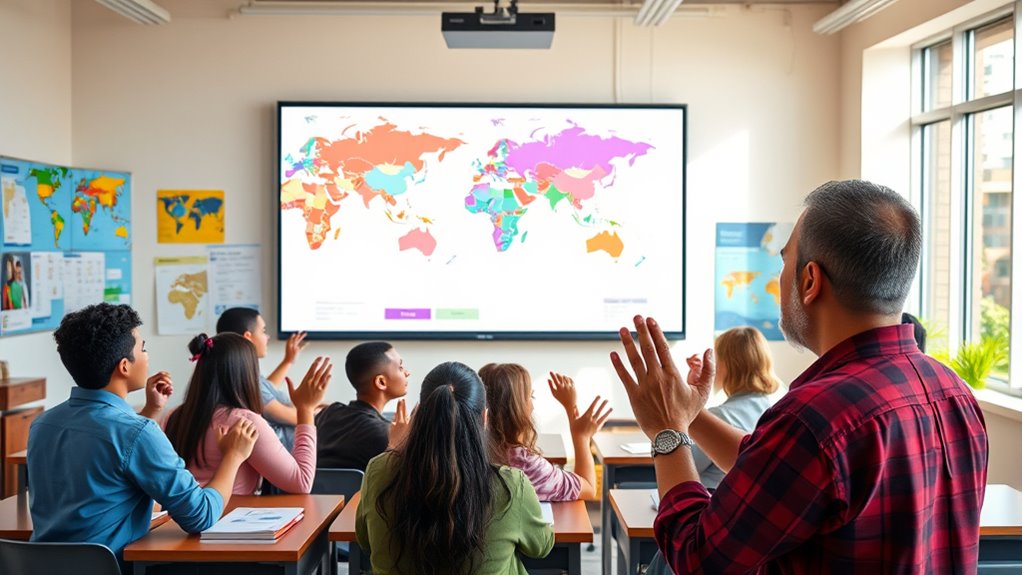
Partnering with deaf communities worldwide helps you build inclusive networks that support students’ unique needs. These collaborations open doors to cultural exchange opportunities and deepen your understanding of diverse communication styles. Strengthening communication strategies becomes easier when you work directly with local deaf communities, ensuring programs are truly accessible. Incorporating best practices for communication can further enhance the effectiveness of these programs.
Building Inclusive Networks
Building strong, inclusive networks with Deaf communities worldwide is essential for creating meaningful study abroad experiences. When you connect with local Deaf organizations, you gain access to valuable peer mentorship opportunities, which can help you navigate cultural differences and academic challenges. These relationships foster mutual understanding and trust, making your integration smoother. Emphasizing cultural sensitivity is vital; it shows respect for the community’s norms and communication styles. By actively engaging with Deaf peers and leaders, you help build a supportive environment that benefits everyone. Such networks not only enrich your personal growth but also promote long-term collaboration. As you develop these connections, you contribute to a more inclusive global Deaf community, ensuring that future students find welcoming, accessible spaces abroad. Recognizing the importance of cultural sensitivity is especially crucial when working across different countries and communities.
Cultural Exchange Opportunities
Engaging in cultural exchange opportunities with Deaf communities worldwide opens doors to authentic learning experiences that go beyond the classroom. These programs enable you to immerse yourself in different Deaf cultures, fostering cultural immersion and language exchange. You’ll gain firsthand insights into unique communication styles, traditions, and social norms, enriching your understanding of global Deaf experiences. Participating in community events, workshops, or social gatherings deepens your connection and appreciation for diverse perspectives. Here’s a quick look at some key aspects:
| Aspect | Benefits | Examples |
|---|---|---|
| Cultural immersion | Builds empathy and global understanding | Attending Deaf festivals in different countries |
| Language exchange | Enhances communication skills | Partnering with local Deaf peers |
| Community involvement | Fosters meaningful relationships | Volunteering in local Deaf centers |
Enhancing Communication Strategies
To effectively enhance communication strategies with Deaf communities worldwide, establishing strong, respectful partnerships is essential. Building trust allows you to understand and incorporate local gestural language and visual communication practices. Collaborate directly with community members to learn their preferred methods of interaction and adapt your approach accordingly. Focus on creating environments that support visual communication, such as using clear signage and visual aids. Remember, success depends on mutual respect and cultural sensitivity. Consider these key points:
- Engage with local Deaf organizations for insights
- Respect regional variations in gestural language
- Train staff in visual communication techniques
- Foster inclusive environments that prioritize visual methods
- Monitoring stimulation levels and adapting communication methods accordingly can help ensure effective engagement.
Resources and Technologies Facilitating Communication Abroad
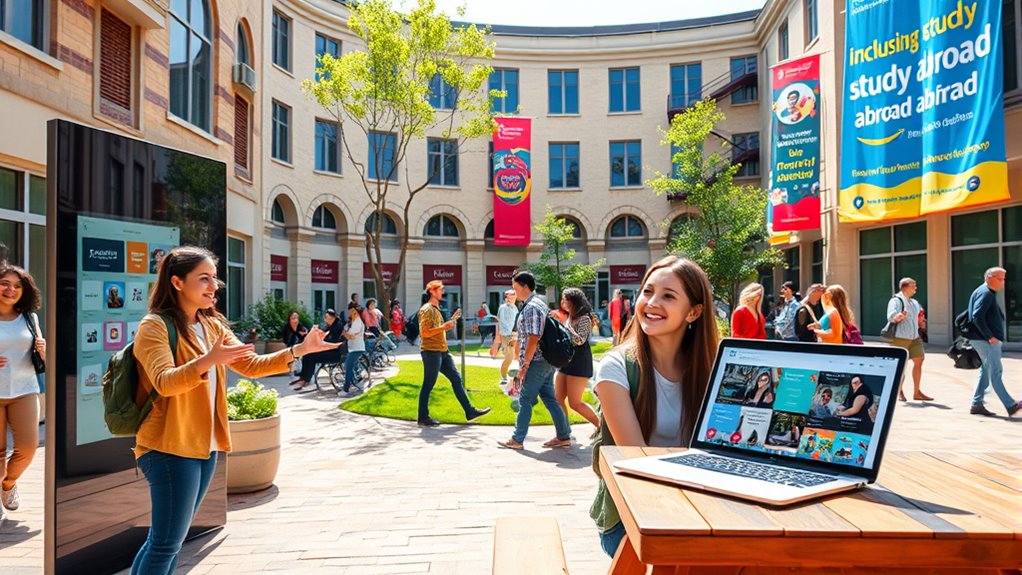
When studying abroad, deaf students can access a variety of resources and technologies that make communication more manageable. Sign language apps are invaluable, allowing you to translate conversations quickly and connect with local deaf communities. These apps often include dictionaries, video tutorials, and live interpretation features. Visual communication tools also play a crucial role, such as real-time captioning services, speech-to-text apps, and portable tablets that display written information clearly. Many universities and organizations provide devices and software specifically designed for deaf students, ensuring seamless interaction in academic settings and daily life. By leveraging these resources and technologies, you can navigate your abroad experience with confidence, staying connected and engaged despite language barriers.
Scholarships and Funding Opportunities for Deaf Study Abroad Students
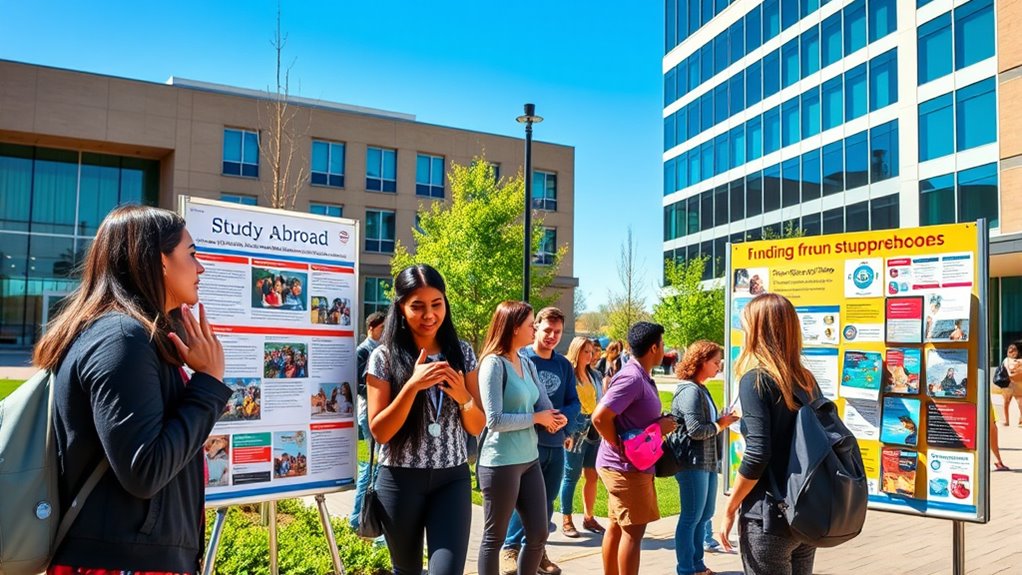
Are you aware of the numerous scholarships and funding opportunities available specifically for deaf students pursuing study abroad programs? Many organizations offer financial support to help you access global education. You should explore options like sign language scholarships, which support students who use sign language, and deaf student grants designed specifically for deaf learners. These resources can markedly reduce financial barriers. Keep in mind:
- Many universities partner with organizations offering specialized funding.
- Some government programs provide grants for students with disabilities.
- Private foundations often focus on promoting deaf students’ international education.
- Applying early increases your chances of securing funding.
- Understanding financial aid options related to Gold IRA rollovers can also help diversify your resources for educational pursuits.
Success Stories of Deaf Students Studying Abroad
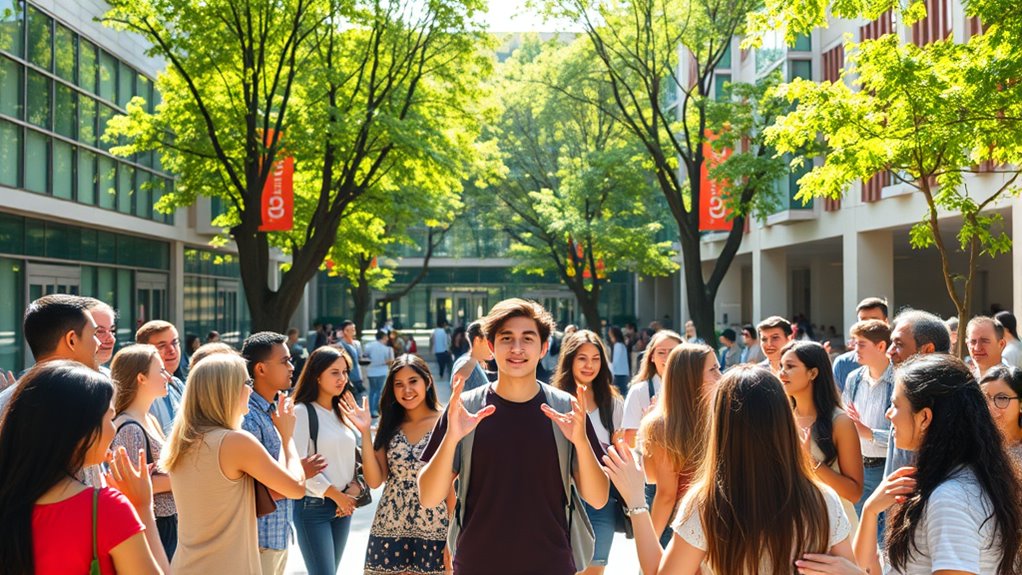
Many deaf students have successfully studied abroad, breaking through barriers and inspiring others to pursue international education. These students often rely on sign language interpretation services to navigate classes and social settings confidently. Through accessible communication, they engage fully with coursework and cultural experiences. Deaf peer mentoring also plays a crucial role, providing support, guidance, and shared understanding that helps students adapt and thrive in foreign environments. A strong emphasis on privacy policies and accessible accommodations ensures that these students’ rights are protected and their needs met. These success stories highlight that with the right accommodations and community support, deaf students can excel academically and socially abroad. Their achievements demonstrate that barriers can be overcome, encouraging more deaf students to consider international programs. Their journeys prove that with determination and accessible resources, studying abroad becomes an achievable and rewarding goal.
Tips for Preparing to Study Abroad as a Deaf Student

Building on the inspiring stories of deaf students who have succeeded abroad, you can increase your chances of a smooth experience by preparing carefully before you leave. Address potential challenges like language barriers and cultural differences early on. Research the host country’s communication options, such as sign language interpreters or captioning services. Connect with local deaf communities or organizations to gain insights and support. Consider taking a language or cultural orientation course to familiarize yourself with customs and social norms. Additionally, assure your academic institution has accommodations in place.
- Learn key phrases in the local sign language or spoken language
- Arrange for accessible communication services in advance
- Understand cultural etiquette and sensitivities
- Build a support network both at home and abroad
Frequently Asked Questions
How Do I Find Programs Specifically Tailored for Deaf Students?
To find programs tailored for deaf students, start by researching universities and organizations that emphasize inclusivity. Look for those offering sign language resources and strong Deaf community support. You can also reach out to student support services or disability offices for guidance. Attending informational sessions or joining online forums can connect you with programs that prioritize accessibility, ensuring you find a study abroad experience that truly meets your needs.
Are There Language Barriers Unique to Deaf Students Abroad?
Imagine a world where silent conversations speak volumes. You might face unique language challenges abroad, mainly due to sign language accessibility and cultural communication differences. While many countries embrace diverse communication styles, some may have limited resources for sign language users. You can overcome these barriers by researching programs with strong support systems, using technology, and connecting with local deaf communities to guarantee smooth, meaningful interactions during your international experience.
What Safety Considerations Are There for Deaf Students Overseas?
When studying abroad, safety is vital for deaf students. You should arrange for sign language interpreters to guarantee clear communication, especially in emergencies. It’s also essential to understand the local emergency preparedness protocols and have accessible safety information. By planning ahead, you can navigate potential challenges confidently, making your experience safer and more enjoyable. Always communicate your needs and verify that support systems are in place before your departure.
How Can Deaf Students Access Emergency Services Abroad Effectively?
Ever wondered how you can access emergency services effectively abroad? You can use emergency communication tools like text messaging apps or apps with sign language interpretation features. Carrying a card with your emergency contacts and details in the local language helps. Also, learn how to connect with local sign language interpreters or services beforehand. These steps help ensure you’re prepared and can communicate your needs clearly in urgent situations.
What Cultural Differences Might Impact Deaf Students’ Experiences Internationally?
When you travel internationally, cultural differences can impact your experience as a deaf student, especially around sign language accessibility and cultural awareness. You might encounter varying attitudes toward deafness or differing sign language systems. Being proactive in understanding local customs and advocating for your needs helps. Embracing cultural awareness guarantees smoother communication, and seeking out communities or resources familiar with sign language accessibility can greatly enhance your international experience.
Conclusion
Exploring study abroad programs that welcome deaf students shows that inclusivity isn’t just a theory—it’s happening. Many universities actively create accessible environments, proving that with the right support and technology, deaf students can thrive abroad. So, don’t let misconceptions hold you back. Embrace the opportunities available, and you’ll see that studying abroad isn’t just possible for deaf students—it’s a transformative experience that’s well within your reach.

